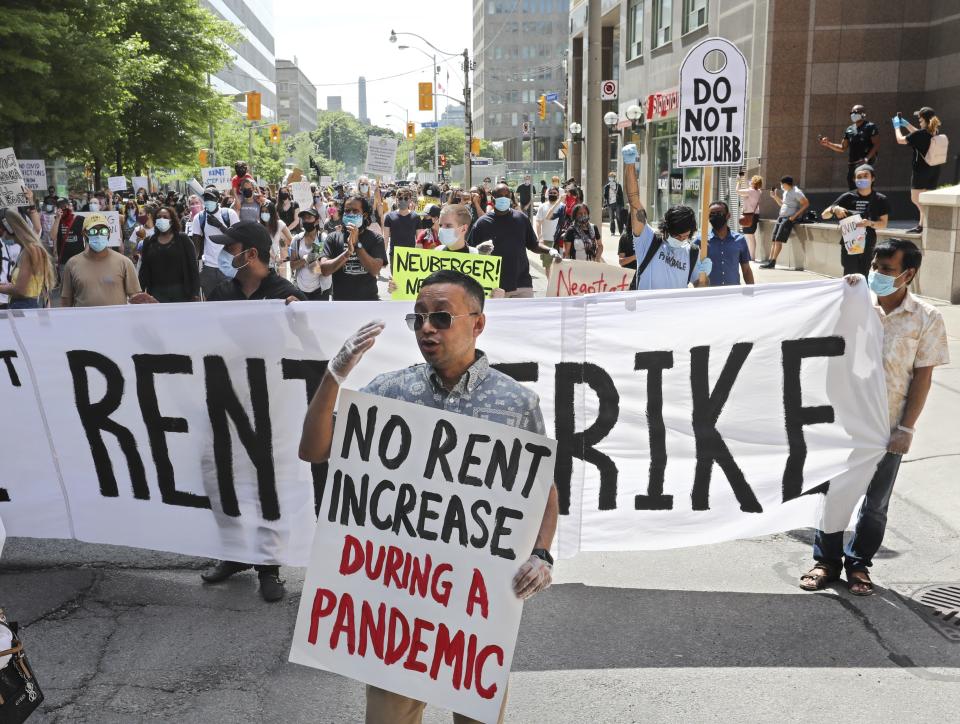Government extends moratorium on some foreclosures and evictions through August
Cost-strapped renters and homeowners won’t get kicked out of their homes this summer if their properties are backed by Fannie Mae or Freddie Mac, according to the Federal Housing Finance Agency.
The government-sponsored entities that guarantee millions of mortgages extended their foreclosure and eviction protections until Aug. 31 for single-family properties because of the coronavirus pandemic.
The move affects tens of millions of Americans: In 2019, almost 43% of new mortgages were backed by Fannie or Freddie. In the 12 preceding years, that share was higher.
Read more: Coronavirus: Here’s what to do if you can’t pay your mortgage
The original expiration date was June 30 for properties with mortgages backed by the pair.
"To protect borrowers and renters during the pandemic we are extending the enterprises' foreclosure and eviction moratorium,” said Mark Calabria in a press release, director of the FHFA, which oversees Fannie and Freddie. “During this national health emergency, no one should worry about losing their home.”

The extension comes after 31 percent of Americans made just a partial housing payment or no payment at all in the first week of May, according to a survey from Apartment List, a rental listing site. That includes both rent payments and mortgage payments.
Read more: Coronavirus: Here's what to do if you can’t pay rent
The original extensions are part of the Coronavirus Aid, Relief, and Economic Security (CARES) Act signed on March 27, which made it unlawful to evict renters in homes financed by GSE-backed mortgages.
“There’s a good chance it’ll need to be extended again,” said Jeremy Sopko, CEO at Nations Lending, a mortgage lender. “Remember, there’s still a lot of unknowns about the long-term impact of the pandemic.”
About 45 million Americans have filed for unemployment benefits since the pandemic started, according to the latest jobless claims data. In May, the jobless rate was 13% and 20.5 million Americans counted themselves unemployed.
Read more: What is a mortgage? Here are the basics
An extension on a month-by-month basis would be the most effective way to gauge the strength of the economy, Sopko said.
“Remember the idea is to keep the homeowners whole and keep the economy afloat,” Sopko said. “It’s not in anyone’s best interest to create more of a safety net than is required. Doing so on a month-by-month basis is the more prudent way to do it.”
The Mortgage Bankers Association is advocating for even more aid, saying the government should offer a helping hand.
“MBA believes it is necessary to support the millions of renters who are currently experiencing or could experience housing instability due to job losses related to the COVID-19 pandemic,” said Mike Flood, a senior vice president and policy member at the MBA, in an emailed statement to Yahoo Money. “This is why MBA has been calling for emergency rental assistance, as we believe it is the most efficient mechanism to the overall health of the real estate finance market.”
Read more:
Half of Americans took from retirement savings or plan to amid pandemic, survey finds
Read the latest financial and business news from Yahoo Finance and Yahoo Money
Follow Yahoo Finance on Twitter, Facebook, Instagram, Flipboard, SmartNews, LinkedIn, YouTube, and reddit.

 money
money 
